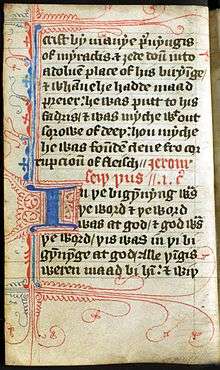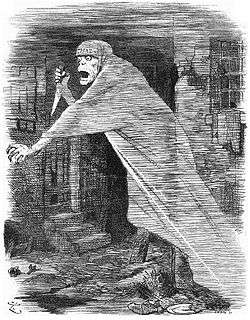Comes the Inquisitor
| "Comes the Inquisitor" | |
|---|---|
| Babylon 5[1] episode | |
|
Sheridan refuses to answer a question | |
| Episode no. |
Season 2 Episode 21 |
| Directed by | Mike Vejar |
| Written by | J. Michael Straczynski |
| Produced by | John Copeland |
| Featured music | Christopher Franke |
| Cinematography by | John C. Flinn, III A.S.C. |
| Editing by | Skip Robinson |
| Production code | 221 |
| Original air date |
8 August 1995 (UK) 25 October 1995 (US) |
| Running time | optional |
| Guest appearance(s) | |
|
Wayne Alexander (Sebastian) | |
"Comes the Inquisitor" is an episode from the second season of the science fiction television series Babylon 5.
Synopsis
This section describes the plot summary in A-Plot/B-Plot format.[1]
A-Plot
The Vorlons bring an "inquisitor" to the station, a human male named Sebastian, to test Delenn's readiness to lead the "army of light". Surprised that a human is working directly for the Vorlons, Sheridan questions the man about his past, eliciting little more than that he was from Earth, and lived in London in the year 1888.
When Delenn meets with Sebastian, he gives her a pair of bracelets. She may take them off at any time, but will fail the test if she does. He asks her a simple question: "Who are you?" When the answers she gives are unacceptable to him, he uses the bracelets to administer painful shocks. The pain increases with each wrong answer, until eventually the shocks envelop her entire body. When Sheridan attempts to rescue Delenn, he finds himself captured by Sebastian and subjected to similar torture. Only after Delenn declares her willingness to die in order to save Sheridan does Sebastian conclude both Delenn and Sheridan are, indeed, the "right people, in the right place, at the right time".
Sheridan does some investigating and discovers that there was a man named Sebastian in London who disappeared in 1888 – the day after the last of a well-known series of murders. Sebastian acknowledges that it was no coincidence: he believed, like Delenn, that he was "chosen" for a "holy cause" – until he was abducted by the Vorlons and taken into their service. The Vorlons have been keeping him alive for 400 years, pulling him from stasis when needed for this inquisitorial service for which he was "ideally suited". Although it is not specifically stated, Sebastian's identity seems clear when Sheridan mentions the dates and Sebastian leaves with his parting words: "...remembered not as a reformer, not as a prophet, not as a hero...not even as Sebastian. Remembered only...as Jack".
B-Plot
G'Kar begins buying weapons in order to be smuggled back to the Narn homeworld for an underground resistance against the Centauri occupiers. Garibaldi learns of this, and orders G'Kar to not use Babylon 5 as a port through which these weapons are smuggled. G'Kar agrees, and Garibaldi provides G'Kar with an alternative, safer route.
The Narn population of Babylon 5 begins to question G'Kar's credibility as leader of the Narns on the station. In order to gain their loyalty, G'Kar agrees to get a personal message through to the Narn homeworld, to which all communications have been cut off by the Centauri. G'Kar turns to Sheridan for help in doing this, and Sheridan enlists the Rangers, who successfully get the message through, ending the current challenges to G'Kar's leadership of the Babylon 5 Narns.
Arc significance
- This episode presents another example of someone, in this case the Vorlons, wondering whether or not Delenn has messianic delusions. (This was the reason given for her being removed from the Grey Council in "All Alone in the Night", and she ultimately breaks up the Grey Council in the cause of prophecy in "Severed Dreams". Neroon states she has messianic delusions in "Grey 17 Is Missing").
- The Vorlons have visited Earth in the past. According to Sebastian, they have been everywhere – and still are.
- G'Kar starts a public propaganda campaign against the Centauri.
Production details
- Sheridan states Sebastian's disappearance date as 11 November 1888 after "the last of a string of murders".[1] The "last of the string" of Ripper murder victims, Mary Jane Kelly, was slain on 9 November 1888.

- Due to a mistake in the screenplay, Sheridan remarks that Jack the Ripper committed his murders in the "West End" of London, when in fact the murders took place in the East End.[2] After the original airing, the line was dubbed over to correct this error, and the dubbed version can be found on the DVD release.[1][2] The captions have not been corrected and still refer to the "West End" of London.[1] With reference to the gaffe, writer Straczynski has stated, "So I content myself with the notion that it's west...of B5. Now if you'll excuse me, I'm going to go shoot myself."[2]
- Straczynski was in part motivated to write this episode to make the Vorlons appear more morally ambiguous. He wanted to point out that people should not instantly fall for what others say they are.[2]
- Actor Wayne Alexander (who was raised in the San Joaquin Valley, California) spoke with such a convincing English accent that many UK viewers believed he was an Englishman. When he was told of this, Alexander was reportedly quite flattered.
Notable out-of-universe references
These are the historical, scientific, literary, cultural and other educational references found in this episode.[1]
- Sebastian's observation, "No greater love hath a man than he lay down his life for his brother", is a paraphrase from the Gospel of John.
- Sebastian describes himself as, "Diogenes with his lamp, looking for an honest man willing to die for all the wrong reasons". Diogenes the Cynic was a Greek philosopher who is reputed to have sought "an honest man".
- Jack the Ripper slew at least five people in London in 1888.
- The limbo sets, camera motion, lighting, and the clipped cadence of the rapid-fire question-and-answers between Delenn and Sebastian were deliberately intended as an homage to "Once Upon a Time," the penultimate episode of The Prisoner television series from the 1960s. Joe Straczynski has spoken of how influential that series was to him on several occasions, and there are several other nods throughout the course of the series. This is the most detailed, however. He later wrote the foreword to The Prisoner's Dilemma (by Jonathan Blum and Rupert Booth), a novel of The Prisoner, in which he expressed his admiration for that series.
Out-of-universe media gallery
This media from Wikimedia Commons illustrates the references in this episode.
 14th century Bible translation
14th century Bible translation
Gospel of John Diogenes looks for an honest man, painting, c. 1780's
Diogenes looks for an honest man, painting, c. 1780's
Diogenes "The Nemesis of Neglect"—There floats a phantom on the slum's foul air..., cartoon and poem, September 1888
"The Nemesis of Neglect"—There floats a phantom on the slum's foul air..., cartoon and poem, September 1888
Jack the Ripper
References
- 1 2 3 4 5 6 Straczynski, J. Michael (Writer), Vejar, Mike (Director) (29 April 2003). Babylon 5: The Complete Second Season (The Coming of Shadows) (DVD) (in English, French, and Spanish). Burbank, CA 91522: Warner Home Video. Event occurs at disc 6, episode 21, "Comes the Inquisitor". ASIN B000087EYB. ISBN 0-7907-7605-7. OCLC 52143178. UPC 085392424221, Wikipedia Babylon 5 season releases. Archived from the original on 15 December 2009. Retrieved 2009-12-15.
When the darkness comes, know this: You are the right people, in the right place, at the right time.
- 1 2 3 4 Straczynski, J. Michael (13 July 2004). "Comes the Inquisitor (at Lurker's Guide)". The Lurker's Guide to Babylon 5. Steven Grimm. Archived from the original on 12 January 1998. Retrieved 2009-12-19.
He *hates* the memory of Jack; it's not his name, the one thing that is his...remember, he is caught up with "who ARE you?" and his answer to that is lost in the persona created by history...his true name, is what's totally forgotten to history.
External links
- "Comes the Inquisitor" at Wikiquote
- "Comes the Inquisitor" at the Internet Movie Database
- "Comes the Inquisitor" at The Lurker's Guide to Babylon 5
